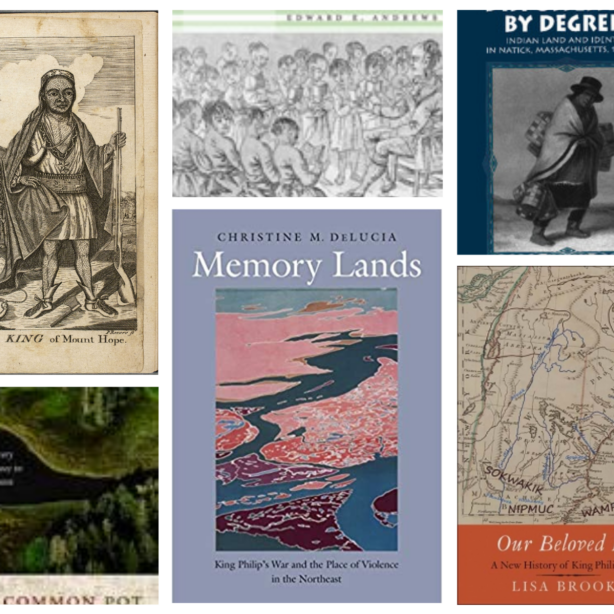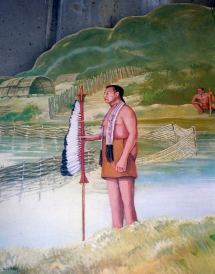
Indigenous Peoples History Hub
The work of History Cambridge takes place on the traditional homelands of the Massachusett people.
In this Hub
- Introduction
- The Illusion of Colonial Boundaries
- Books
- Journals
- Highlighted Features
- Websites and Other Online Resources
- Take a look at some of the partners of the Massachusett Tribe
- Take Action (Bills and Laws)
Introduction
Welcome to the Indigenous Peoples History Hub. In 2018, History Cambridge created a land acknowledgment in commitment to doing good history and telling the whole story of Cambridge. Though acknowledging our occupation of Indigenous land is an important step in recognizing the presence of Indigenous life, we must also make a continued effort to learn from and engage with the past and present histories of Native life and culture in the spaces we occupy. The creation of this hub is only the beginning of these efforts. Over time we hope to expand the hub to fill the gaps in recorded history and uplift the stories and voices of Indigenous peoples past and present.
“All around us, we see markers and signs that Cambridge was established in 1630, as though no one was already living here. The Massachusett people had villages here. That is where the name of this state comes from. The Massachusett and thousands of others from this region –Nipmuc, Wampanoag, many others – traveled on footpaths here for thousands of years and on the Quinobequin [Quinn-AH-buh-quinn] River, or what the English renamed the Charles River. Our people had names for places, for the rivers, for the coves and villages. When the English came, they dispossessed the Massachusett and everyone else of nearly all their lands. Lands where the Massachusett had farmed and lived were reserved for the exclusive use of the English settlers. Often, historians will say that it was disease that wiped out so many thousands of our people – entire villages – as though the problem was that we had weak immune systems. But our decimation cannot be called an accident…They did not merely fade into the mists of time.”
Moonanum James, member of the Wampanoag Tribe of Aquinnah and co-leader of United American Indians of New England, from an address to the Cambridge City Council in 2016.
The Illusion of Colonial Boundaries
While exploring this hub, you will notice that many of the locations mentioned are not Cambridge-specific. It is essential to note that the invasion of white settlers on the land of the Massachusett tribe also brought about the division of land. Settler colonialism not only displaced the Indigenous people of this region but is also responsible for the land boundaries we see today. From Natick to Ponkapoag, there is a presence of Massachusett life, culture, and history due to their forced removal from their traditional homelands, of which the majority were stolen, sold, and renamed. With this, be mindful that the history of the Massachusett tribe goes far beyond the boundaries of Cambridge, and that many of its surviving members exist within and outside of our community today.
Books
Explore the following works concerning the studies of Indigenous peoples in Massachusetts (links open in new tabs):
- Our Beloved Kin: A New History of King Philip’s War by Lisa Brooks, 2019
- The Common Pot: The Recovery of Native Space in the Northeast by Lisa Brooks, 2008
- Memory Lands: King Philip’s War and the Place of Violence in the Northeast By Christine M. DeLucia, 2018
- Native Apostles: Black and Indian Missionaries in the British Atlantic World by Edward E. Andrews, 2013.
- Dispossession by Degrees: Indian Land and Identity in Natick, Massachusetts, 1650–1790 by Jean M. O’Brien, 1997.
- Firsting and Lasting: Writing Indians out of Existence in New England by Jean M. O’Brien, 2010.
- The Networked Wilderness: Communicating in Early New England by Matt Cohen, 2009.
Journals
- “Indians and Images: The Massachusetts Bay Colony Seal, James Printer, and the Anxiety of Colonial Identity” by Cathy Rex, American Quarterly, Vol. 63, No. 1 (March 2011)
- “Dead Men Tell No Tales: John Sassamon and the Fatal Consequences of Literacy” by Jill Lepore, American Quarterly, Vol. 46, No. 4 (Dec., 1994)
- “The Death of John Sassamon: An Exploration in Writing New England Indian History” by James P. Ronda and Jeanne Ronda, American Indian Quarterly, Vol. 1, No. 2 (Summer, 1974)
Highlighted Figures

The Massachusett Sagamore, Chickataubut, detail of a mural by Joshua Winer
Websites and Other Online Resources
Discover the official site of the Massachusett tribe at Ponkapoag, as well as online sites, guides, and exhibitions dedicated to providing resources and information for and about Indigenous Peoples of Massachusetts.
- Massachusett Tribe at Ponkapoag
- The official website of the Massachusett Tribe at Ponkapoag. The Massachusett tribe are the descendants of the original people that the English Invaders first encountered in what is now the Commonwealth of Massachusetts.
- Gedakina
- Gedakina focuses on the challenges and hardships that Native American youth, women, and communities face daily and are rooted in multi-generational exposure to systemic poverty, oppression and violence.
- Cultural Survival
- Cultural Survival is a Cambridge-based, Indigenous-led NGO and U.S. registered non-profit that advocates for Indigenous Peoples’ rights and supports Indigenous communities’ self-determination, cultures and political resilience, since 1972.
- Our Beloved Kin Online Resource
- This section of focuses on events that occurred throughout Nipmuc territory, and interactions with Cambridge and Boston.
- Indigenous Peoples Day Massachusetts
- Indigenous Peoples Day MA is a coalition of organizations and individuals who work to get Indigenous Peoples Day legislation passed in Massachusetts and to implement celebrations.
- Native Northeast Research Collaborative
- The Native Northeast Research Collaborative’s Native Northeast Portal contains primary source materials by, on, or about Northeast Indians from repositories around the world.
- Harvard Peabody Museum
- The Harvard Peabody Museum Collections Online provides access to approximately 700,000 object records and over 600,000 associated digital media records.
- Commission on Indian Affairs for the State of Massachusetts
- Indian Affairs fundamental role is to assist Native American individuals, tribes and organizations in their relationship with state and local government agencies and to advise the Commonwealth in matters pertaining to Native Americans.
- Native American and Indigenous Studies at Umass Boston
- Native American and Indigenous Studies (NAIS) program coordinates a number of resources and exciting opportunities for students to learn more about local, national, and international issues of concern to Indigenous communities. These include guest lectures, film screenings, and other events.
- Land-Grab Universities
- This unique database was created through extensive reporting and research into primary source materials, including land patent records, congressional documents, historical bulletins, historical maps, archival and print resources at the National Archives, state repositories and special collections at universities and more.
- Upstander Project
- Upstander Project uses storytelling to amplify silenced narratives, develop upstander skills to challenge systemic injustice, and nurture compassionate, courageous relationships that honor the interconnection of all beings and the Earth.
- Watch the short film Bounty to learn about the hidden story of the Phips Proclamation, one of many scalp-bounty proclamations used to exterminate Native people in order to take their land in what is now New England. An extensive teacher’s guide is also available.
- Watch Dawnland and learn how for decades, child welfare authorities have been removing Native American children from their homes to “save them from being Indian.” The films focuses on the first official Truth and Reconciliation Commission in the United States begins a historic investigation in Maine. Teacher’s and Viewer’s Guides are also available.
Take a look at some of the partners of the Massachusett Tribe:
- Stone Living Lab
- The Stone Living Lab works at sites in and around the Boston Harbor Islands National and State Park which are part of the traditional homelands of the Massachusett Tribe. The Massachusett Tribe at Ponkapoag are the descendants of the original inhabitants of the Greater Boston area and are active in the work of the Lab.
- Cyrus Dallin Art Museum
- Cyrus Dallin (1861-1944) was a celebrated Utah-born sculptor, educator, and Indigenous rights activist who lived and worked in Arlington, Massachusetts for over 40 years. Their new Indigenous Peoples gallery explores Cyrus Dallin’s representations of Indigenous peoples in the context of his own time, intentions, and values, while also centering the experiences and perspectives of Indigenous peoples of the past and present. The gallery was created in collaboration with Elizabeth Solomon (Massachusett Tribe at Ponkapoag), Forrest Cuch (Ute Tribe), Claudia Tekina-ru Fox Tree (Arawak/Yurumein), and Faries Gray (Massachusett Tribe at Ponkapoag).
Take Action (Bills and Laws)
In addition to learning and understanding the history and continuing legacy of Indigenous Peoples of Cambridge and Eastern Massachusetts, it is also important to acknowledge the present struggles facing Indigenous communities. The section below contains bills that serve to benefit and support the priorities of Indigenous People, such as the protection of Native American heritage and supporting the education and futures of Indigenous Youth. Take a look and see how you can support below:
Current bills supporting Indigenous Legislative Agenda:
- Bill S.2493 192nd (Current)
- An Act prohibiting the use of Native American mascots by public schools in the Commonwealth
- Bill H.3248 193rd (Current)
- An Act to protect Native American heritage
- By Messrs. Rogers of Cambridge and Biele of Boston, a petition (accompanied by bill, House, No. 3385) of David M. Rogers, David Biele and others relative to Native American heritage. Tourism, Arts and Cultural Development.
- Bill S.382 192nd (Current)
- An Act relative to celebrating and teaching Native American culture and history
- By Ms. Rausch, a petition (accompanied by bill, Senate, No. 382) of Rebecca L. Rausch, Jack Patrick Lewis, Joanne M. Comerford, Kip A. Diggs and other members of the General Court for legislation relative to celebrating and teaching Native American culture and history.
- Bill H.582 192nd (Current)
- An Act providing for the creation of a permanent commission relative to the education of American Indian and Alaska Native residents of the Commonwealth
- By Ms. Elugardo of Boston, a petition (accompanied by bill, House, No. 582) of Nika C. Elugardo and others for legislation to establish a permanent commission on American Indian and Alaska Native education.
- Bill S.2027 192nd (Current)
- An Act establishing an Indigenous Peoples Day
- By Ms. Comerford, a petition (accompanied by bill, Senate, No. 2027) of Joanne M. Comerford, Jack Patrick Lewis, Jason M. Lewis, Kay Khan and other members of the General Court for legislation for the issuance of an annual proclamation by the Governor to designate the second Monday in October as indigenous people’s day. State Administration and Regulatory Oversight.
- How to Support
- Contact State Legislators (Representatives and Senators) and ask them to support these bills.
- Attend lobbying events supporting these bills
This History Hub project is ongoing and will be continuously updated. Please contact Marieke Van Damme (mvandamme@historycambridge.org) with any questions or concerns you may have.
